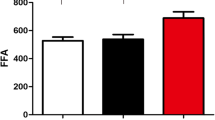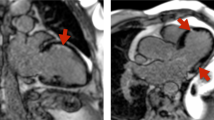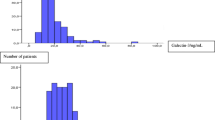Abstract
L-Carnitine plays a role in the utilization of fatty acids and glucose in the myocardium. Previous studies have indicated carnitine deficiency in patients with congestive heart failure. However, the extent of altered carnitine metabolism and left ventricular function is not fully determined. This study is designed to determine if plasma L-carnitine levels can serve as a marker for impaired left ventricular function in patients with congestive heart failure.
To test this hypothesis, plasma and urinary levels of L-carnitine were measured in 30 patients with congestive heart failure (CHF) and in 10 control subjects. CHF was due to dilated cardiomyopathy (DCM) and rheumatic heart disease (RHD). Cardiac functions such as percentage of fractional shortening (%FS), ejection fraction (EF), left ventricular mass index (LVMI), were determined by echocardiography. All patients and control subjects had normal renal functions.
Plasma carnitine was significantly higher in patients with DCM (37.05 ± 7.62, p < 0.0001) and with RHD (47.2 ± 8.04, p < 0.0001) vs. the control subjects (14.4 ± 5.30 mg/L). Urinary carnitine was significantly higher in DCM (49.13 ± 14.11, p < 0.0001) and in RHD 43.53 ± 15.5, p < 0.0001), than the control (25.1 ± 5.78 mg/L). Plasma carnitine level correlated significantly with impaired left ventricular systolic functions in these patients: %FS < 25% (r = -0.38 and p = 0.038), EF < 0.55 (r = -0.502 and p = 0.005) and LMVI > 124 gm/m2 (r = 0.436, and p = 0.016). These data suggest that elevated plasma and urinary carnitine levels in patients with CHF could serve as a marker for myocardial damage and impaired left ventricular functions.
Similar content being viewed by others
References
Evans JR, Opie LH, Shipp JC: Metabolism of palmitic acid in perfused rat heart. Am J Physiol 205: 706-707, 1963
Fritz IB: Carnitine and its role in fatty acid metabolism. Adv Lipid Res 1: 285-334, 1963
Broderick TL, Quinney HA, Lopaschuk GD: Carnitine stimulation of glucose oxidation in the fatty acid perfused isolated working rat heart. J Biol Chem 267: 3758-3763, 1992
Abdelaleem S, Sayed Ahmed M, Nada M, Hendrickson S, St Louis JS, Lowe JE: Stimulation of non-oxidative glucose metabolism by L-carnitine in isolated myocytes. J Mol Cell Cardiol 27: 2465-2472, 1995
Shug AL, Thomson JH, Folts JD, Bittar N, Kleim MI, Koke JR, Huth PJ: Changes in tissue levels of carnitine and other metabolites during myocardial ischemia and anorexia. Arch Biochem Biophys 187: 25-33, 1978
Liedtke AJ, Nellis SN: Effects of carnitine in ischemic and fatty acid supplemented swine hearts. J Clin Invest 64: 440-447, 1979
Molaparast-Saless F, Nellis SH, Liedtke AJ: The effects of propionyl carnitine taurine on cardiac performance in aerobic and ischemic myocardium. Mol Cell Cardiol 20: 63-74, 1988
Böhles H, Noppeney TH, Akcetin Z, Rein J, Von der Emde J: The effects of preoperative L-carnitine supplementation on myocardial metabolism during aorta-coronary bypass surgery. Curr Ther Res 39: 429-435, 1986
Corr PB, Gross RW, Sobel BE: Amphipathic metabolites and membrane dysfunction in ischemic myocardium. Circ Res 55: 135-154, 1984
Van der Vusse GJ, Prinzen FW, Van Bilsen-Engels W, Reneman RS: Accumulation of lipids and lipid intermediates in the heart during ischemia. Basic Res Cardiol 82(suppl I): 157-167, 1987
Katz Am, Messino FC: Lipid-membrane interactions in the myocardium. Circ Res 48: 1-16, 1981
Wu J, Corr PB: Influence of long chain acylcarnitines on voltage dependent calcium current in adult ventricular myocytes. Am J Physical 263: H410-H417, 1992
ElAlaowi-Talibi Z, Moravec J: Carnitine transport and exogenous palmitate oxidation in chronically volume overload rat hearts. Biochem Biophys Acta 1003: 109-114, 1989
Keene BW, Panciera Dl, Alkins CE, Regitz V, Schmidt MJ, Shug AL: Myocardial L-carnitine deficiency in a family of dogs with dilated cardiomyopathy. J Am Vet Med Assoc 198: 647-650, 1991
Whitmer JT: L-carnitine treatment improves cardiac performance and restore high energy phosphate pools in cardiomyopathic Syrian hamster. Circ Res 61: 396-408, 1987
Shug AL: Protection from adriamycin-included cardiomyopathy in rats. Z Kardiol 76(suppl 5): 46-52, 1987
Regitz V, Shug AL, Fleck E: Defective myocardial carnitine metabolism in congestive heart failure secondary to dilated cardiomyopathy and to coronary, hypertensive, and valvular heart disease. Am J Cardiol 65: 755-760, 1990
Pierpont MEM, Judd D, Goldenberg IF, Rings WS, Olivari MT, Pierpont GL: Myocardial carnitine in end stage congestive heart failure. Am J Cardiol 64: 56-60, 1989
Regitz V, Bossaller C, Strasser R, Müller M, Shug AL, Fleck E: Metabolic alterations in end stage and less severe heart failure-myocardial carnitine decrease. J Clin Chem Clin Biochem 28: 611-617, 1990
Wittles B, Spann JF Jr: Defective lipid metabolism in the failing heart. J Clin Invest 47: 1787-1794, 1968
Wieland OH: In: Methods of Enzymatic Analysis, vol. III, 3rd edn. Weinheim, Deerfield Beach, Florida, 1985, 481-488
Devereux RB, Reichek N: Echocardiographic determination of left ventricular mass in man. Anatomic validation of the method. Circulation 55: 613, 1977
Teichholz LE, Kreulen T, Herman MV, Gorlin R: Problems in echocardiographic volume determination; Echocardiographic-angiographic correlation in the presence and absence of asynergy. Am J Cardiol 37: 7, 1976
Feldman AM, Waber LJ, DeMent SH, Olson JL, Baughman KL: Plasma carnitine levels in adults with dilated cardiomyopathy. Heart Failure 3: 39-44, 1987
Tripp ME, Shug AL: Plasma carnitine concentrations in cardiomyopathy patients. Biochem Med 32: 199-206, 1984
Author information
Authors and Affiliations
Rights and permissions
About this article
Cite this article
El-Aroussy, W., Rizk, A., Mayhoub, G. et al. Plasma carnitine levels as a marker of impaired left ventricular functions. Mol Cell Biochem 213, 37–41 (2000). https://doi.org/10.1023/A:1007142919941
Issue Date:
DOI: https://doi.org/10.1023/A:1007142919941




